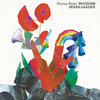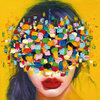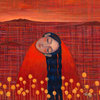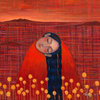UNSPOKEN by Julie Campiche
Tracklist
| 1. | Anonymous | |
| 2. | Grisélidis Réal | |
| 3. | Rosa | 5:10 |
| 4. | Andréa Bescond | |
| 5. | Las Patronas | |
| 6. | Tarana Burke | |
| 7. | Maman du Ciel | |
| 8. | Zaïna | |
Credits
releases January 16, 2026
Tracks
Anonymous: Recordings of women pronouncing Virgina Woolfs famous sentence, each in their own tongue; a chorus of women’s voices to create a sense of community. Voices that reveal the women behind the anonymity, voices that remind us that we are not a minority but that we are one half of humanity.
Musically, this piece is deliberately unvarnished to give full rein to the vocals. It features beatboxing and drumming sounds, evoking a heartbeat, as well as a tense chord with sustained notes that gradually emerge. The music remains in the background, creating a growing tension in parallel with the powerful sound of the choir.
Grisélidis Real: A groove with sounds that symbolise the different aspects of the life of Grisélidis Real, a photocopier for her role as a campaigner, footsteps on cobblestones to represent prostitution, the sound of pencil on paper for the writer, children's laughter symbolising her role as a mother, etc. This groove is the basis of the music. Next, the emotional intent of the track is to match the intensity of this woman's voice, to convey the cry of revolt as well as the silent sigh of pain, the lust for life and the fatigue of a tormented daily life. The mood is inspired by a dance atmosphere, without descending into pure entertainment.
Rosa: Rosa has no family name. This composition renders homage to all the women who work in the shadows of our society. Their work allows women in our Western societies to free themselves of household chores and child rearing without putting into question the founding principles of our social structure. The rhythm of this piece is built on repetitive
aspects and the tension that emanates from them. The bass and treble melodies are melancholic and respond to each other in counterpoint. They are played in loops with increasing emphasis and tension.
Andréa Bescond: Dancer, choreographer, actor, author, director, scriptwriter and film director, Andréa Bescond uses her artistic talents to raise awareness about causes close to her heart, to defend the Rights of the Child, to denounce violence against women and children, as well as the lack of justice, protection and prevention.
Las Patronas: A group of Mexican women who help Central American migrants traveling on merchant trains in search of a better future in the United States, by providing them with food and water. Las Patronas prepares 300 meals a day which they to toss in bags to the migrants passing by in the trains. Despite challenges such as harassment and threats from the authorities and criminal groups, these women continue their courageous humanitarian mission. They have become a symbol of hope and solidarity for innumerable Central American migrants.
This piece, performed without a harp, shares a poem in Spanish, accompanied by a drum and a shruti, an Indian acoustic instrument that produces drones.
Tarana Burke: In 2006, the American social activist created the hashtag MeToo to support and empower women who had experienced sexual abuse. Her work went little known for many years until 2017 when the white community discovered it and spread the information on social media. This in itself highlights the complexity of diverse forms of oppression. The piece includes lyrics from Tarana Burke’s acceptance speech for the Variety Power of Women Award, 2018.
Maman du Ciel: A French artist who uses street art to denounce incest and intrafamilial violence as she struggles to recuperate her parental rights. Her 7-year-old daughter has been placed in paternal custody. In custody with the same father who is under penal investigation for incest! To let her daughter know that she is fighting for her, she places images of colorful humming birds that they once drew together along the street to her school.
This track is a vocal polyphony with the question « Why can't you hear? », running in a loop. The harp plays a bass melody and a polyrhythm to underline the imbalance and instability. Julie improvises vocally over the polyphony to evoke a lullaby.
Zaïna: This piece was Julie Campiche’s very first composition. Its inclusion is truly symbolical as it embodies the essence of innocence. Every woman, before taking on the feminine identity and the social construct associated with it, is first and foremost a human being. This piece unfolds entirely acoustically, without any use of electronical devices. It literally emerges from silence, building gradually around an improvisation, reaching its climax with the melody sung and played on the harp. This progression symbolises both the fragility and the power of innocence, capturing all its complexity and emotional richness.
JULIE CAMPICHE: UNSPOKEN
LINE UP:
Julie Campiche Harp, voice, electronics, samples
Fabien Iannone Bass, tom on tracks Zaina, Andréa Bescond, Maman du ciel, Rosa,
Las Patronas
Recorded by: Marelle Studio by Fabien Iannone June 2024
Mixed by: Martin Ruch, Leo Fumagalli, Julie Campiche and Nik Bärtsch
Mastered by: Martin Ruch
Composed and arranged by: Julie Campiche
Produced by: Julie Campiche and Leo Fumagalli
Published by: Ronin Rhythm Productions & Neonstars Publishing
Drawings by: Nelly Hagmann, Lily Hagmann
Visuals by: Sophie Le Meillour
Graphic design by: Fabrice Hagmann
Pictures by: Nicolas Spuhler, Cathy Karatchian
Tracks
Anonymous: Recordings of women pronouncing Virgina Woolfs famous sentence, each in their own tongue; a chorus of women’s voices to create a sense of community. Voices that reveal the women behind the anonymity, voices that remind us that we are not a minority but that we are one half of humanity.
Musically, this piece is deliberately unvarnished to give full rein to the vocals. It features beatboxing and drumming sounds, evoking a heartbeat, as well as a tense chord with sustained notes that gradually emerge. The music remains in the background, creating a growing tension in parallel with the powerful sound of the choir.
Grisélidis Real: A groove with sounds that symbolise the different aspects of the life of Grisélidis Real, a photocopier for her role as a campaigner, footsteps on cobblestones to represent prostitution, the sound of pencil on paper for the writer, children's laughter symbolising her role as a mother, etc. This groove is the basis of the music. Next, the emotional intent of the track is to match the intensity of this woman's voice, to convey the cry of revolt as well as the silent sigh of pain, the lust for life and the fatigue of a tormented daily life. The mood is inspired by a dance atmosphere, without descending into pure entertainment.
Rosa: Rosa has no family name. This composition renders homage to all the women who work in the shadows of our society. Their work allows women in our Western societies to free themselves of household chores and child rearing without putting into question the founding principles of our social structure. The rhythm of this piece is built on repetitive
aspects and the tension that emanates from them. The bass and treble melodies are melancholic and respond to each other in counterpoint. They are played in loops with increasing emphasis and tension.
Andréa Bescond: Dancer, choreographer, actor, author, director, scriptwriter and film director, Andréa Bescond uses her artistic talents to raise awareness about causes close to her heart, to defend the Rights of the Child, to denounce violence against women and children, as well as the lack of justice, protection and prevention.
Las Patronas: A group of Mexican women who help Central American migrants traveling on merchant trains in search of a better future in the United States, by providing them with food and water. Las Patronas prepares 300 meals a day which they to toss in bags to the migrants passing by in the trains. Despite challenges such as harassment and threats from the authorities and criminal groups, these women continue their courageous humanitarian mission. They have become a symbol of hope and solidarity for innumerable Central American migrants.
This piece, performed without a harp, shares a poem in Spanish, accompanied by a drum and a shruti, an Indian acoustic instrument that produces drones.
Tarana Burke: In 2006, the American social activist created the hashtag MeToo to support and empower women who had experienced sexual abuse. Her work went little known for many years until 2017 when the white community discovered it and spread the information on social media. This in itself highlights the complexity of diverse forms of oppression. The piece includes lyrics from Tarana Burke’s acceptance speech for the Variety Power of Women Award, 2018.
Maman du Ciel: A French artist who uses street art to denounce incest and intrafamilial violence as she struggles to recuperate her parental rights. Her 7-year-old daughter has been placed in paternal custody. In custody with the same father who is under penal investigation for incest! To let her daughter know that she is fighting for her, she places images of colorful humming birds that they once drew together along the street to her school.
This track is a vocal polyphony with the question « Why can't you hear? », running in a loop. The harp plays a bass melody and a polyrhythm to underline the imbalance and instability. Julie improvises vocally over the polyphony to evoke a lullaby.
Zaïna: This piece was Julie Campiche’s very first composition. Its inclusion is truly symbolical as it embodies the essence of innocence. Every woman, before taking on the feminine identity and the social construct associated with it, is first and foremost a human being. This piece unfolds entirely acoustically, without any use of electronical devices. It literally emerges from silence, building gradually around an improvisation, reaching its climax with the melody sung and played on the harp. This progression symbolises both the fragility and the power of innocence, capturing all its complexity and emotional richness.
JULIE CAMPICHE: UNSPOKEN
LINE UP:
Julie Campiche Harp, voice, electronics, samples
Fabien Iannone Bass, tom on tracks Zaina, Andréa Bescond, Maman du ciel, Rosa,
Las Patronas
Recorded by: Marelle Studio by Fabien Iannone June 2024
Mixed by: Martin Ruch, Leo Fumagalli, Julie Campiche and Nik Bärtsch
Mastered by: Martin Ruch
Composed and arranged by: Julie Campiche
Produced by: Julie Campiche and Leo Fumagalli
Published by: Ronin Rhythm Productions & Neonstars Publishing
Drawings by: Nelly Hagmann, Lily Hagmann
Visuals by: Sophie Le Meillour
Graphic design by: Fabrice Hagmann
Pictures by: Nicolas Spuhler, Cathy Karatchian








